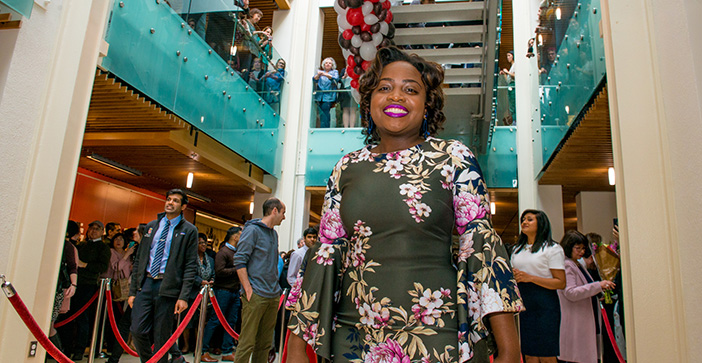From clinical variety to serving the community, graduates explain why they chose the specialty.
Noon, March 16: Match Day at the Warren Alpert Medical School. Excited students flocked to form lines to receive their red envelopes with their residency match results. While their loved ones and friends cheered, balloons descended from above to mark the highly celebrated annual event.
This day was different from previous matches for the Department of Family Medicine. This year the Medical School is sending 14 students—a record number—into the field of family medicine. “This is the highest number of students from the Warren Alpert Medical School entering family medicine since the year 1996,” Jeffrey Borkan, MD, PhD, chair of the Department of Family Medicine, says. “We hope that this is the beginning of a trend.”
To help understand why interest was so high this year and to promote the specialty among other students, the Family Medicine Interest Group invited five of the recently matched students to share their reasons for entering the specialty with 20 prospective Warren Alpert medical students.
I was drawn to family medicine because I liked both obstetrics and emergency medicine. In some places where you’re the town doctor, you have to be ready for anything. I have met family doctors who had to perform breech deliveries or manage an intubated patient on a ventilator when there was no other help available. I am heading to the Ventura County Medical Center residency in California.
Ellen Richardson ’14 MD’18, who is bound for the Family Medicine Residency of Idaho in Boise, said of her choice, “For me it is really the philosophy of family medicine and the idea that you are committed to serving a community and whatever the community needs you can fill the role for them.”
The panelists also said that being a family medicine physician would allow them to provide a comprehensive range of care, from managing chronic disease to practicing obstetrics and critical care. “If you want to do primary care, family medicine is essentially the best training in that,” Patrick Kelley MD’18, who matched at the Strong Memorial Family Medicine Residency, in Rochester, NY, said. “You will never have nearly as many outpatient visits in your residency unless you do family medicine.”
Others said their interest in other medical specialties led them to choose family medicine. “For me, coming in, I was interested in primary care, but I was also super interested in psychiatry,” said Rachel Ellenbogen ’11 MD’18, who also matched at Strong Memorial. “There is a huge psychiatry component in family medicine and caring for people with chronic illness that I find rewarding. I think family medicine trains you to care for patients and treat them as people.”
A common reason for choosing the specialty was love for continuity of care and desire to accompany patients throughout their lives. “Continuity and building relationships are huge for me,” Reuben Baker MD’18, who is also going to the Family Medicine Residency of Idaho, said. “In family medicine you have the potential to serve an entire family. When someone is pregnant and delivers a baby, you don’t have to pass their care off to an obstetrician.” Other students agreed, citing how they were able to follow patients of all ages from the inpatient to outpatient settings during their family medicine rotations in medical school.
Social advocacy was yet another motivator. “Coming into medical school I always knew I was interested in primary care and leaning heavily toward family medicine,” Andrea Haynes MD’18 said. “I saw myself as a doctor with an interest in working with underserved communities and addressing health care disparities.” Haynes is headed to the College of Community Health Sciences, University of Alabama School of Medicine program in Tuscaloosa.
Richardson agreed. “You could be the doctor in the statehouse, and it gives you an opportunity to talk to politicians. Also there are family medicine residencies that can offer you the opportunity to participate in health policy concentrations,” she said.
Several rotations and electives in the Medical School’s curriculum helped the fourth-year students to make informed decisions about family medicine. Rotations at the Family Care Center in Pawtucket and sub-internships at The Miriam Hospital provided valuable insight into how family physicians embrace preventive health and the concept of holistic care. Many of the students mentioned how their rural family medicine rotation on Block Island showed them how family medicine is practiced in remote settings and what life as the town physician could be like.
The future of family medicine appears tied to the future of primary care. The Association of American Medical Colleges expects a shortage of primary care physicians over the next 10 years. The Warren Alpert Medical School has risen to the challenge of addressing this issue.
“There is hope moving forward that even more students at Brown will enter primary care specialties, including family medicine,” says Paul George ’01 MD’05 RES’08, assistant dean for medical education and associate professor of family medicine. The Primary Care-Population Medicine Program, of which he is director, offers students a medical degree and a Master of Science in Population Medicine.
“This program encourages students to go into primary care specialties and lead some aspect of health care,” he says. “It is my hope that we will also help alleviate a projected primary care physician shortage through this program.”




